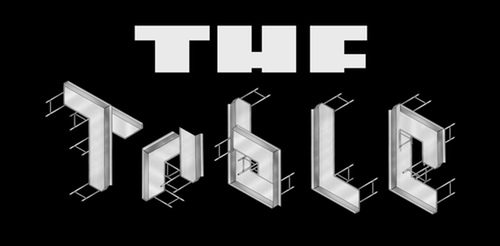 Tomorrow, June 23rd, the New Museum and Rhizome will present THE
TABLE, a 5-hour day-into-night performance by DJ/producers Kingdom
(Ezra Rubin), NGUZUNGUZU (Asma Maroof & Daniel Pineda), and Total
Freedom (Ashland Mines) in collaboration with Wu Tsang. Part of
Tsang’s residency at the New Museum “We Remember Stories, Not Facts,”
THE TABLE is a live performance/webcast that brings together a group
of artists who believe in DJing as an art form. In advance of the
event, we posed 2 questions to Tsang to give some context for the
event, its participants, and background.
Tomorrow, June 23rd, the New Museum and Rhizome will present THE
TABLE, a 5-hour day-into-night performance by DJ/producers Kingdom
(Ezra Rubin), NGUZUNGUZU (Asma Maroof & Daniel Pineda), and Total
Freedom (Ashland Mines) in collaboration with Wu Tsang. Part of
Tsang’s residency at the New Museum “We Remember Stories, Not Facts,”
THE TABLE is a live performance/webcast that brings together a group
of artists who believe in DJing as an art form. In advance of the
event, we posed 2 questions to Tsang to give some context for the
event, its participants, and background.
I’m excited to have Kingdom, NGUZUNGUZU, Total
Freedom, and you (of course), in a focused event at the Museum. Like
so many other DJs/ producers, their work is broadly influential—or
rather broader than the fine art sphere, and moving through lots of
different contexts in the U.S. and internationally. And yet there is
also something specific to the way you all work as collaborators,
which I imagine the structure of the event (you all around a table)
will throw into relief. I wonder how their work will translate into
the space of the 7th floor, i.e. not a club. Can you describe this
event, and what the inspiration for it was?
THE TABLE started in Los Angeles after Wildness, a club I did with Total Freedom (Ashland Mines) and NGUZUNGUZU (Asma Maroof & Daniel Pineda), ended in 2010. I think Wildness was the origin of major artistic development for all of us. We started out as amateurs still learning how to use our equipment, but we hosted performers every week for 2 years and we eventually got more sophisticated about our ideas and skills. For us, THE TABLE is like "next level" sound/music/art intervention, by putting the dj table in the center of the dance-floor. It was majorly guided by Ashland, who is a natural conceptualizer and leader in our group. It was also an opportunity for the DJs really explore their sound/practice as I was evolving more into the host role, which is something that still inspires me. Being a host feels closer to being a curator than an artist, because you are creating the frame or platform for the art, and working in details that people don't necessarily notice, but that really determine the quality of the event. We were only able to do THE TABLE a couple times and I always felt the format deserved more attention. Also, TF NG and Kingdom started doing daytime USTREAM sets, which sort of fused with what I was excited about: the idea of partying in the afternoon with a cup of tea - a gesture about bigger commitment to the lifestyle. For example, we recently did an event to raise money for a community elder/performer who had financial hardships. Nightclub singers generally don't have retirement plans; and it's something I care a lot about - what happens to all of us when the lights come on, and the magic fades away. That was also the impetus to start a legal clinic next door to the Silver Platter. Because for many of us - especially queer/poc communities - the club space can be central to being and surviving, so it serves a bigger purpose day and night. I know this sentiment is a far cry from what the actual TABLE event IS, but I hope that these warmth and politics are somehow embedded deep in there.
Because Wildness became a community, and thus a co-creation of so many different artists and collaborators, are there particular strategies or films you are looking to in writing this history?
Within Wildness there were so many amazing co-creators, but our scene was also forming inside a preexisting one. So it was a community, but it was also a coalition between young artists and immigrant trans women at the Silver Platter. The LA Weekly once categorized us as "art damaged 20-somethings and third-world gender illusionists" which at the time really pissed me off, because I felt reduced to evil stereotypes. But now I'm able to appreciate what was actually going on in the room, because we WERE a crazy diverse group of people, and we weathered some intense race/class tension together. Wildness the party created a way for us to actually BE together and SEE each other; a real crossroads. I struggled for a long time with editing the film because I felt an enormous burden of representation. But at a certain point the demands of storytelling took over, and basically eliminated the possibility of any real "truth" or accuracy. The way forward turned out to be a personal narrative; I realized the more subjective I could be in telling my own experience of the situation, the more ethical I could be to my subjects and collaborators- and tell a better the story! Documentary is total fiction, so why not have fun with that? I've always been inspired by films like Born in Flames, Young Soul Rebels, and Hail the New Puritan, which capture important "real" moments in time, but also fully invest in the fantasy of the filmmaker's agenda.

